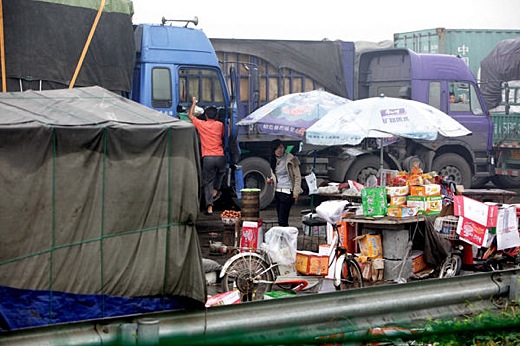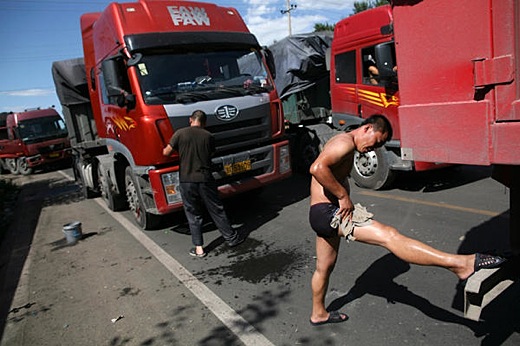SUBHEAD: China's mega-traffic jam in second week. It's like Woodstock, but without the rock & roll or LSD.
By Peter Ford on 24 August 2010 for Christian Science Monitor -
(http://www.csmonitor.com/World/Global-News/2010/0824/China-traffic-jam-enters-Day-11.-A-tale-of-deceit-and-criminality)


By Peter Ford on 24 August 2010 for Christian Science Monitor -
(http://www.csmonitor.com/World/Global-News/2010/0824/China-traffic-jam-enters-Day-11.-A-tale-of-deceit-and-criminality)

Image above: Trucks jam up on the National Highway 207 in Wanquan county in north China's Hebei province Monday. From article. For gallery go to (http://www.csmonitor.com/CSM-Photo-Galleries/In-Pictures/China-s-huge-traffic-jam).
China's traffic jam, which has lasted a full 10 days and is expected to last weeks, is being blamed on highway roadwork, compounded by minor accidents and a few breakdowns. But the real culprit? Coal.
China's traffic jam, which has lasted a full 10 days and is expected to last weeks, is being blamed on highway roadwork, compounded by minor accidents and a few breakdowns. But the real culprit? Coal.
Never a country to do things by halves, China has extended its reputation for gigantism into a new field with what must be the longest traffic jam in the world.
Thousands of trucks are packed nose to tail for more than 60 miles in a 10-day traffic jam northwest of Beijing that makes even the most trying morning commute in the US look like a breeze.

Image above: Trucker baths rag out of a bucket of water. From article.
Tempers are fraying as drivers find themselves at the mercy of local residents charging them outlandish prices for instant noodles and cigarettes – the Chinese trucker’s staple diet (along with amphetamines). The police blame the monstrous jam on highway roadwork, compounded by minor accidents and a few breakdowns.
In fact, the mega blockage – the second in two months on a stretch of road about 130 miles northwest of the capital – is a tale of deceit and criminality that speaks volumes about China’s breakneck economic development. And behind the traffic chaos stands King Coal. China relies on coal for 70 percent of its energy needs.
For years, small illegal coal mines in the province of Shanxi provided Beijing and its surroundings with a good deal of coal but so many of the mines would collapse or explode, and so many miners would die, (over 1,600 nationwide last year according to official figures) that the local authorities have closed most of them down.
That’s all very well, but China being China, the province of Inner Mongolia, to the North of Shanxi, has taken up the slack. And an awful lot of the trucks currently snarled on the G110 expressway to Beijing are carrying coal mined illegally in Inner Mongolia. They are taking the G110, drivers explained to the daily Beijing News, because there are no coal checkpoints on that highway, so they don’t have to bribe any inspectors to turn a blind eye to their illegal loads.
The roadwork is due to continue until the middle of September, which bodes ill for truckers on the G110. It will probably take a great deal longer to close down the illegal mines feeding the traffic jams.
Tempers are fraying as drivers find themselves at the mercy of local residents charging them outlandish prices for instant noodles and cigarettes – the Chinese trucker’s staple diet (along with amphetamines). The police blame the monstrous jam on highway roadwork, compounded by minor accidents and a few breakdowns.
In fact, the mega blockage – the second in two months on a stretch of road about 130 miles northwest of the capital – is a tale of deceit and criminality that speaks volumes about China’s breakneck economic development. And behind the traffic chaos stands King Coal. China relies on coal for 70 percent of its energy needs.
For years, small illegal coal mines in the province of Shanxi provided Beijing and its surroundings with a good deal of coal but so many of the mines would collapse or explode, and so many miners would die, (over 1,600 nationwide last year according to official figures) that the local authorities have closed most of them down.
That’s all very well, but China being China, the province of Inner Mongolia, to the North of Shanxi, has taken up the slack. And an awful lot of the trucks currently snarled on the G110 expressway to Beijing are carrying coal mined illegally in Inner Mongolia. They are taking the G110, drivers explained to the daily Beijing News, because there are no coal checkpoints on that highway, so they don’t have to bribe any inspectors to turn a blind eye to their illegal loads.
The roadwork is due to continue until the middle of September, which bodes ill for truckers on the G110. It will probably take a great deal longer to close down the illegal mines feeding the traffic jams.
.
No comments :
Post a Comment